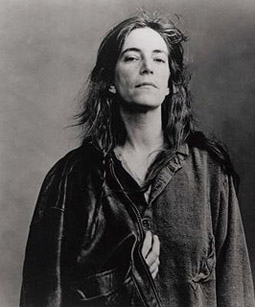Search
Rychard Carrington reports on Patti Smith – The Junction, 23 Oct 2007

Rather rashly, I would say ‘yes'.
Certainly in terms of the ratio of my appreciation of the performance to my appreciation of the performer's recorded oeuvre, only Iggy Pop comes close. Having listened to Smith's records again back home, they now seem to cry out for the immediacy of live performance, for the in-the-moment human-to-human communication, to fully realise their tortured, supremely humane passion.
‘This is dedicated to the monks of Myanmar, formerly known as Burma. And if you think it's strange to dedicate this song to monks, the reason is because I love them.' There follows Because the Night, seemingly just (just?) a song about amorous pleasure. And if you think that too intense a way for a singer to introduce her only Top 20 hit, please leave.
This gig was ******* intense. Brilliantly, supremely intense, a stunning artistic realisation of the vulnerable, abused, defiant elation whose pulse gives life meaning and emotional potency. And yet it was an ordinary intensity. For Patti Smith intensity is an everyday mode. She is relaxed with it, she jokes with it. The whole essence of the performance is communication through empathy. She compels the audience to relate, to identify. A few wallies commented ‘she's obviously high'. Were they really so ignorant, or just scared?
Smith is often associated with punk. In fact she does rightly belong within the New York CBGBs New Wave of the 1970s, alongside, especially, Talking Heads and Television. But that scene boasted great craftsmanship, pertinent poetry - very far from the crude energy of London punk. Smith has far more in common with Bob Dylan than with the boorish Sex Pistols. In common with Dylan, her primary affinity is with beat poetry's relocation of humanism and romanticism into a modern urban bohemian gutter. Tonight, in fact, she proudly pays her dues: to rock and roll in revitalising, reintensifying cover versions of Are You Experienced?, Smells Like Teen Spirit, Gimme Shelter and Perfect Day (‘I thought I was someone else / someone good'); and to a much older, broader heritage of literary pursuit and intellectual study. She revelled in expressing delight at having had tea in the Fellows Room at Kings College, under a portrait of Rupert Brooke. The irony of this honour being decreed to a ‘Rock'n'Roll Nigger' (the title of her definitive anthemic union of beat poetry and rock sensibilities), was savoured, but sincere appreciation of heritage was greater. (At school, she informed us, she was thoroughly versed in Shelley, but failed a crucial test because of her difficulties with trigonometry. She persisted at maths at a higher level, however; although she was better at appreciating its inherent beauty than at getting the sums right. A further academic rejection on this count lead her to CBGBs.) After tea, Patti had also sought out the graveyard in All Souls Lane, where Ludwig Wittgenstein, James George Frazer and other intellectual luminaries are buried. How many other visiting rockers make that pilgrimage?
If sheer presence was the most crucial facet, the wit, pertinence and spontaneity of her inter-song commentary was second equal with the taut strength of the musical performance. Her long-established band work superbly together. It was particularly a treat to see lead guitarist Lenny Kaye, himself a legend amongst cognoscenti as a critic and champion of 60s garage rock, a rich legacy epitomised by The Seeds' Pushin' Too Hard, which Lenny led the band in tonight, while Patti jumped into the audience.
Patti Smith was wearing a t-shirt with the word ‘love' written on it. Tonight she ignited the true meaning of this most common subject of song, as the essence of vitality, sensitivity, celebration and struggle. She declared us to be the spiritual people at war; at war with the corporate and, by implication, with everything not affirming of love. Art can't get more powerful, more essential than that, I think.
Writer: Rychard Carrington